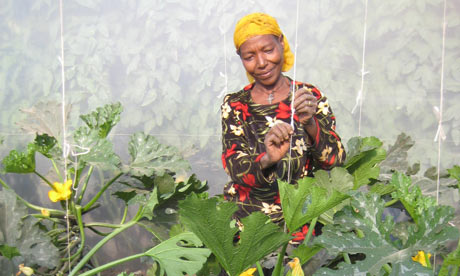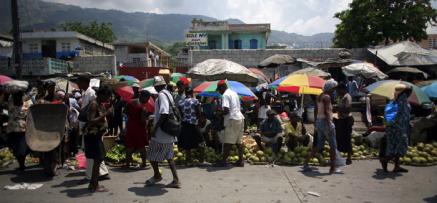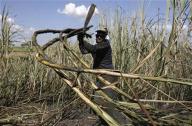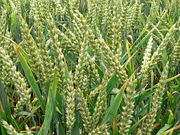biofuel
Why Did A Train Carrying Biofuel Cross The Border 24 Times And Never Unload?
– Why did a Train Carrying Biofuel Cross the Border 24 Times and Never Unload? (Oil Price, Jan 1, 2013):
A cargo train filled with biofuels crossed the border between the US and Canada 24 times between the 15th of June and the 28th of June 2010; not once did it unload its cargo, yet it still earned millions of dollars. CBC News of Canada was the first to pick up on this story on the 3rd of December 2012, and began their own investigation into the possible explanations behind this odd behaviour.
Read moreWhy Did A Train Carrying Biofuel Cross The Border 24 Times And Never Unload?
Kenya Biofuels Land Grab: ‘This land ownership is giving us a headache. We know there are people who have sold our land when it isn’t theirs to sell. They are criminals and we will fight them, with guns and with sticks’ – ‘We lived in paradise, in peace’ ‘Now what? No water, only salty water, land thieves and water thieves, and children with empty stomachs’
– Biofuels land grab in Kenya’s Tana Delta fuels talk of war (Guardian, July 2, 2011):
Villagers vow to resist as wildlife vanishes and they are driven from their land to make way for water-thirsty crops.
Gamba Manyatta village is empty now, weeds already roping around the few skeletal hut frames still standing. The people who were evicted took as much of their building materials as they could carry to start again and the land where their homes stood is now ploughed up.
Mohamed Abdi, 13, points out where his hut used to be. His was the last of the 427 families to leave. “They told us we would be burned out if we didn’t go,” he said. “They drove machinery round and round the village all day and all night to drive people out. No one understood why, as the village had been there for more than 25 years.”
The 21st-century African land grab by rich countries facing global food and water shortages
Highly recommended article.
An Observer investigation reveals how rich countries faced by a global food shortage now farm an area double the size of the UK to guarantee supplies for their citizens

A woman tends vegetables at a giant Saudi-financed farm in Ethiopia.
We turned off the main road to Awassa, talked our way past security guards and drove a mile across empty land before we found what will soon be Ethiopia’s largest greenhouse. Nestling below an escarpment of the Rift Valley, the development is far from finished, but the plastic and steel structure already stretches over 20 hectares – the size of 20 football pitches.
The farm manager shows us millions of tomatoes, peppers and other vegetables being grown in 500m rows in computer controlled conditions. Spanish engineers are building the steel structure, Dutch technology minimises water use from two bore-holes and 1,000 women pick and pack 50 tonnes of food a day. Within 24 hours, it has been driven 200 miles to Addis Ababa and flown 1,000 miles to the shops and restaurants of Dubai, Jeddah and elsewhere in the Middle East.
Ethiopia is one of the hungriest countries in the world with more than 13 million people needing food aid, but paradoxically the government is offering at least 3m hectares of its most fertile land to rich countries and some of the world’s most wealthy individuals to export food for their own populations.
The 1,000 hectares of land which contain the Awassa greenhouses are leased for 99 years to a Saudi billionaire businessman, Ethiopian-born Sheikh Mohammed al-Amoudi, one of the 50 richest men in the world. His Saudi Star company plans to spend up to $2bn acquiring and developing 500,000 hectares of land in Ethiopia in the next few years. So far, it has bought four farms and is already growing wheat, rice, vegetables and flowers for the Saudi market. It expects eventually to employ more than 10,000 people.
But Ethiopia is only one of 20 or more African countries where land is being bought or leased for intensive agriculture on an immense scale in what may be the greatest change of ownership since the colonial era.
An Observer investigation estimates that up to 50m hectares of land – an area more than double the size of the UK – has been acquired in the last few years or is in the process of being negotiated by governments and wealthy investors working with state subsidies. The data used was collected by Grain, the International Institute for Environment and Development, the International Land Coalition, ActionAid and other non-governmental groups.
The land rush, which is still accelerating, has been triggered by the worldwide food shortages which followed the sharp oil price rises in 2008, growing water shortages and the European Union’s insistence that 10% of all transport fuel must come from plant-based biofuels by 2015.
Read moreThe 21st-century African land grab by rich countries facing global food and water shortages
The Great Biofuels Con
According to the World Bank’s top economist, Don Mitchell, biofuels had been responsible for three-quarters of the 140 per cent rise in world food prices between 2002 and 2008. It was this that last October prompted Jean Ziegler, the UN’s “special rapporteur on the right to food”, to comment that biofuels could only bring “more hunger to the poor people of the world” and were a “crime against humanity”.
________________________________________________________________________________________

Yellow peril: while Britain’s farmers are encouraged to turn their fields over to rapeseed for biofuels, the world food crisis has driven people in Ethiopia to the brink of starvation
Rarely in political history can there have been such a rapid and dramatic reversal of a received wisdom as we have seen in the past 18 months over biofuels – the cropping of living plants, such as soya beans, wheat and sugar cane, to generate energy.
Two years ago biofuels were still being hailed as a dream solution to what was seen as one of the most urgent problems confronting mankind – our dependence on fossil fuels, which are not only finite but seemed to be threatening the world with the catastrophe of global warming.
World Bank: Biofuels behind rising food prices

LONDON (AFP) – Biofuels have caused world food prices to increase by 75 percent, according to the findings of an unpublished World Bank report published in The Guardian newspaper on Friday.
The daily said the report was finished in April but was not published to avoid embarrassing the US government, which has claimed plant-derived fuels have pushed up prices by only three percent.
Biofuels, which supporters claim are a “greener” alternative to using fossil fuel and cut greenhouse gas emissions, and rising food prices will be on the agenda when G8 leaders meet in Japan next week for their annual summit.
The report’s author, a senior World Bank economist, assessed that contrary to claims by US President George W. Bush, increased demand from India and China has not been the cause of rising food prices.
“Rapid income growth in developing countries has not led to large increases in global grain consumption and was not a major factor responsible for the large price increases,” the report said.
Droughts in Australia have also not had a significant impact, it added. Instead, European and US drives for greater use of biofuels has had the biggest effect.
Related articles:
– The Price Of Food: 2007 – 2008
– Floods may boost world food prices for years
– Philippines: Food Shortage Looms – Arroyo Adviser
The European Union has mooted using biofuels for up to 10 percent of all transport fuels by 2020 as part of an increase in use of renewable energy.
Why Floods Bring America To Its Knees
Related articles:
– Floods may boost world food prices for years
– Floods wipe out US crops
– The Best Farmland in the U.S. Is Flooded; Most Americans Are Too Stupid to Panic
– The Price Of Food: 2007 – 2008
– The U.S. Has No Remaining Grain Reserves
– Nine meals from anarchy – how Britain is facing a very real food crisis
– Time to Stockpile Food?
– Food Riots are Coming to the U.S.
– UN alert: One-fourth of world’s wheat at risk from new fungus
– THE FOUR HORSEMEN APPROACH – FAMINE IS IN THE AIR

A catastrophe for Iowa farmers will not be just a catastrophe for Midwestern Americans. In the Iowa floods, we’ll see more evidence of how the problems of weird weather (climate change) combine and ramify the problems associated with Peak Oil. In this particular case they lead to an inflection point sometime around the 2008 harvest season, which will also be our time of political harvest.
These are not your daddy’s or granddaddy’s floods. These are 500-year floods, events not seen before non-Indian people started living out on that stretch of the North American prairie. The vast majority of homeowners in Eastern Iowa did not have flood insurance because the likelihood of being affected above the 500-year-line was so miniscule – their insurance agents actually advised them against getting it.
The personal ruin out there will be comprehensive and profound, a wet version of the 1930s Dust Bowl, with families facing total loss and perhaps migrating elsewhere in the nation because they have no home to go back to.
Iowa in 2008 will be an even slower-motion disaster than Hurricane Katrina in 2005. Beyond the troubles of 25,000 people who have lost all their material possessions is a world whose grain reserves stand at record lows. The crop losses in Iowa will aggravate what is already a pretty dire situation. So far, the US public has experienced the world grain situation mainly in higher supermarket prices.
Cheap corn is behind the magic of the American processed food industry – all those pizza pockets and juicy-juice boxes that frantic Americans resort to because they have no time between two jobs and family-chauffeur duties to actually cook (note: reheating is not cooking).
Biofuel Plants Go Bankrupt on Feedstock Costs
NEW YORK — Soaring corn and soy prices on top of rising construction costs and tight credit markets have pushed about a dozen U.S. biofuel plants to file for bankruptcy protection, experts said.
Prices for corn, the feedstock for most U.S. ethanol plants, hit fresh records above $8 per bushel this week as floods this month in the Midwest have caused billions of dollars of crop damage.
“Corn prices are making the feasibility of ethanol plants every day more and more questionable,” said Alex Moglia, president of Moglia Advisors in suburban Chicago, which helps biofuel companies restructure.
Meanwhile prices for soy oil, the feedstock for most biodiesel plants, have been been high on rising global demand for months, making life miserable for most producers. The miserable profit margins have pushed many makers of the alternative motor fuel to run plants at only about half of their capacity.
Moglia said about 12 small to midsize biodiesel and ethanol plants have declared bankruptcy in recent months. Renova Energy LLC, a company that owns a partially built 20 million-gallons-per year ethanol plant in Idaho, was the latest to declare bankruptcy last week. Kansas-based Ethanex Energy Inc declared bankruptcy in March.
“There will be more to follow,” said Moglia. Some plants are restructuring their debt and taking steps to manage risks, but many others are not, he said.
Gore Financially Invested in Climate Cause
(CNSNews.com) – Weeks before announcing a $300-million, three-year advertising campaign to raise awareness about global warming, Al Gore was conducting a slide show for a group of investors in Monterey, Calif., touting companies such as Bloom Energy, Amryis , Mascoma and other firms that are not household names — yet.
These bio-fuel and green technology firms could be poised to take off, Gore told his audience.
“Here are just a few of the investments I personally think make sense,” he said during the March 1 presentation. “I have a stake in these so I’ll have a disclaimer there.” (See Video)
Gore’s admitted stake in those companies comes from his partnership in the venture capital firm, Kleiner Perkins Caufield & Byers (KPCB). Gore joined the firm last November, forging a partnership between KPCB and the London-based Generation Investment Management, a firm Gore chairs, and which steers investments in green and “sustainable” companies.
This month, KPCB announced it has invested $500 million into start-up “green growth” companies, and another $700 million into more established greentech, information technology and life science ventures.
The seed money is intended to “grow” the companies so they can be publicly traded. Both funds are closed to further investment. Last week, Generation Investment Management reportedly closed a $683-million “Climate Solutions Fund” to further investment.
The firms, with similar goals, differ in that GIM focuses mostly on public equities, while KPCB focuses on startup or expanding companies that haven’t gone public yet.
But without government action on climate change, some business analysts say green companies backed by KPCB are either unlikely to be profitable or that their growth will be slow.
To Gore’s critics, his financial stake in businesses that could profit from government policies designed to fight global warming demonstrates a motivation other than a selfless desire to protect the planet.
Food Riots are Coming to the U.S.
There is a time for food, and a time for ethical appraisals. This was the case even before Bertolt Brecht gave life to that expression in Die Driegroschen Oper. The time for a reasoned, coherent understanding for the growing food crisis is not just overdue, but seemingly past. Robert Zoellick of the World Bank, an organization often dedicated to flouting, rather than achieving its claimed goal of poverty reduction, stated the problem in Davos in January this year. ‘Hunger and malnutrition are the forgotten Millennium Development Goal.’
Global food prices have gone through the roof, terrifying the 3 billion or so people who live off less than $2 a day. This should terrify everybody else. In November, the UN Food and Agricultural Organization reported that food prices had suffered a 18 percent inflation in China, 13 percent in Indonesia and Pakistan, and 10 percent or more in Latin America, Russia and India. The devil in the detail is even more distressing: a doubling in the price of wheat, a twenty percent increase in the price of rice, an increase by half in maize prices.
Making a killing from hunger

We need to overturn food policy, now!
GRAIN
For some time now the rising cost of food all over the world has taken households, governments and the media by storm. The price of wheat has gone up by 130% over the last year.[1] Rice has doubled in price in Asia in the first three months of 2008 alone,[2] and just last week it hit record highs on the Chicago futures market.[3] For most of 2007 the spiralling cost of cooking oil, fruit and vegetables, as well as of dairy and meat, led to a fall in the consumption of these items. From Haiti to Cameroon to Bangladesh, people have been taking to the streets in anger at being unable to afford the food they need. In fear of political turmoil, world leaders have been calling for more food aid, as well as for more funds and technology to boost agricultural production. Cereal exporting countries, meanwhile, are closing their borders to protect their domestic markets, while other countries have been forced into panic buying. Is this a price blip? No. A food shortage? Not that either. We are in a structural meltdown, the direct result of three decades of neoliberal globalisation.
Farmers across the world produced a record 2.3 billion tons of grain in 2007, up 4% on the previous year. Since 1961 the world’s cereal output has tripled, while the population has doubled. Stocks are at their lowest level in 30 years, it’s true,[4] but the bottom line is that there is enough food produced in the world to feed the population. The problem is that it doesn’t get to all of those who need it. Less than half of the world’s grain production is directly eaten by people. Most goes into animal feed and, increasingly, biofuels – massive inflexible industrial chains. In fact, once you look behind the cold curtain of statistics, you realise that something is fundamentally wrong with our food system. We have allowed food to be transformed from something that nourishes people and provides them with secure livelihoods into a commodity for speculation and bargaining. The perverse logic of this system has come to a head. Today it is staring us in the face that this system puts the profits of investors before the food needs of people.
Multinationals make billions in profit out of growing global food crisis
Speculators blamed for driving up price of basic foods as 100 million face severe hunger

Giant agribusinesses are enjoying soaring earnings and profits out of the world food crisis which is driving millions of people towards starvation, The Independent on Sunday can reveal. And speculation is helping to drive the prices of basic foodstuffs out of the reach of the hungry.
The prices of wheat, corn and rice have soared over the past year driving the world’s poor – who already spend about 80 per cent of their income on food – into hunger and destitution.
The World Bank says that 100 million more people are facing severe hunger. Yet some of the world’s richest food companies are making record profits. Monsanto last month reported that its net income for the three months up to the end of February this year had more than doubled over the same period in 2007, from $543m (£275m) to $1.12bn. Its profits increased from $1.44bn to $2.22bn.
Cargill’s net earnings soared by 86 per cent from $553m to $1.030bn over the same three months. And Archer Daniels Midland, one of the world’s largest agricultural processors of soy, corn and wheat, increased its net earnings by 42 per cent in the first three months of this year from $363m to $517m. The operating profit of its grains merchandising and handling operations jumped 16-fold from $21m to $341m.
Similarly, the Mosaic Company, one of the world’s largest fertiliser companies, saw its income for the three months ending 29 February rise more than 12-fold, from $42.2m to $520.8m, on the back of a shortage of fertiliser. The prices of some kinds of fertiliser have more than tripled over the past year as demand has outstripped supply. As a result, plans to increase harvests in developing countries have been hit hard.
The Food and Agriculture Organisation reports that 37 developing countries are in urgent need of food. And food riots are breaking out across the globe from Bangladesh to Burkina Faso, from China to Cameroon, and from Uzbekistan to the United Arab Emirates.
Read moreMultinationals make billions in profit out of growing global food crisis
Biologists join the race to create synthetic life
Researchers will gather in London this week to outline plans to promote one of the most audacious, and controversial, scientific ideas of the 21st century – synthetic biology.
The new discipline, established by scientists such as human genome pioneer Craig Venter, involves stripping microbes down to their basic genetic constituents so they can be reassembled and manipulated to create new life forms. These organisms can then be exploited to manufacture drugs and fuels or to act as bio-sensors inside the body.
However, some researchers warn that synthetic biology – which is accelerating at a dramatic pace – also poses dangers. In particular, they fear it may already be possible to create deadly pathogens, such as polio or smallpox viruses, from pieces of synthetic DNA ordered over the internet. In future, completely new – and highly dangerous – microbes could be made this way.
IMF alert on starvation and civil unrest

“Children will be suffering from malnutrition” … a UN peacekeeper with locals in Port-au-Prince,
where hunger-provoked protests and looting have left six dead. Photo: AP
THE poorest countries face starvation and civil unrest if global food prices keep rising, says the head of the International Monetary Fund, Dominique Strauss-Kahn.
Hundreds of thousands of people would starve, he said in Washington. “Children will be suffering from malnutrition, with consequences for all their lives.”
He predicted that rising food prices would push up the cost of imports for poor countries, leading to trade imbalances that might also affect developed nations.
“It is not only a humanitarian question,” he said.
Global food prices have risen sharply in recent months, driven by rising demand, poor weather and an increase in the area of land used to grow crops for biofuels.
The United Nations Food and Agriculture Organisation says 37 countries face food crisis. The president of the World Bank, Robert Zoellick, urged members on Sunday to provide $US500 million ($540 million) by May 1 to help alleviate the problem.
Food riots to worsen without global action: U.N.
ROME (Reuters) – Food riots in developing countries will spread unless world leaders take major steps to reduce prices for the poor, the head of the United Nations Food and Agriculture Organisation (FAO) said on Friday.
Despite a forecast 2.6 percent hike (This is disinformation.) in global cereal output this year, record prices are unlikely to fall, forcing poorer countries’ food import bills up 56 percent and hungry people on to the streets, FAO Director General Jacques Diouf said.
“The reality is that people are dying already in the riots,” Diouf told a news conference.
“They are dying because of their reaction to the situation and if we don’t take the necessary action there is certainly the possibility that they might die of starvation. Naturally people won’t be sitting dying of starvation, they will react.”
The FAO said food riots had broken out in several African countries, Indonesia, the Philippines and Haiti. Thirty-seven countries face food crises, it said in its latest World Food Situation report.
Food prices to rise for years, biofuel firms say

Soaring demand for better quality food from rapidly industrializing emerging markets such as China, supply shortages, increased demand for biofuels, and a surging appetite for food commodities by investment funds, have combined to push prices of basic foods higher and higher in recent months.
Stephane Delodder, managing partner of Netherlands-based consultancy iFuel Corporate Advisory, told a conference the problem of rising food prices would persist for some years.
Market forces should eventually help rebalance supply and demand, especially in markets which are not highly regulated, but this could take some time.
“(It could be) a few years at most before the situation returns to normal,” Delodder said.
He said grains and oilseed futures markets, which have corrected down recently after meteoric rises, may already be signaling that supply will rise as farmers raise plantings.
25 Environmental Threats of the Future

Forget genetically modified crops, the great environmental concerns of the future should be nanomaterials, manmade viruses and biomimetic robots.
So say researchers, policymakers and environmental campaigners, who have identified 25 potential future threats to the environment in the UK, which they say researchers should focus on.
In addition to well-publicised risks such as toxic nanomaterials, the acidification of the ocean and increasingly frequent extreme weather events, the list includes some more outlandish possibilities. These include:
” Biomimetic robots that could become new invasive species.
” Experiments involving climate engineering, for instance ocean ‘fertilisation’ and deploying solar shields
” Increased demand for the biomass needed to make biofuel.
” Disruption to marine ecosystems caused by offshore power generation.
” Experiments to control invasive species using genetically engineered viruses.
Could we really run out of food?
Biofuel production, poor harvests and emerging nations’ growing appetites are emptying the world’s pantry, sending prices soaring. It’s a good time to invest in agricultural stocks.
As if a bear market, U.S. credit crunch, energy crisis and city financing emergency were not enough for one year, experts say the world is now facing down the barrel of the worst catastrophe of all: famine.
The very idea that the modern world could run out of food seems ludicrous, but that is the flip side, or cause, of the tremendous recent increase in the cost of raw wheat, corn, rice, oats and soybeans. Food prices are not escalating because speculators have run them up for sport and profit, but because accelerating demand in developing nations, biofuel production and poor harvests in some areas have made basic foodstuffs truly scarce.

(In this article: …global grain reserves are “precarious,” at just 1.7 months of consumption, down from 3.5 months of reserves as recently as 2000.”…)